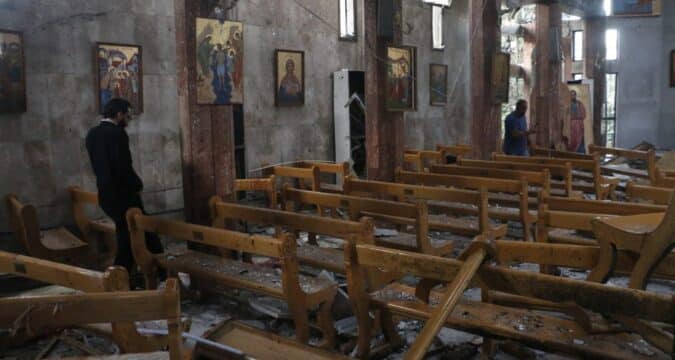
(OSV News): An Islamist suicide bombing at a packed St. Elias Greek Orthodox Church in Damascus that killed at least 20 and injured dozens of worshippers on June 22 has sparked international outrage.
A jihadist entered in the church located in the Dweil’a district of Damascus during a Sunday Divine Liturgy opening fire on parishioners and detonated his explosive vest. Local media reported that children were among the casualties.
“People were praying safely under the eyes of God,” Father Fadi Ghattas said, lamenting, “There were 350 people praying at the church.”
Syrian information minister, Hamza Mostafa, condemned the assault, calling it a terrorist attack, for which the government blamed the Islamic State, but no claim for the bombing has so far been made.
The Latin Patriarchate of Jerusalem condemned the attack June 23.
“It is with profound shock and deep revulsion that we received the tragic news of the suicide bombing at St. Elias Church,” said the Assembly of Catholic Ordinaries of the Holy Land.
“There is no justification—religious, moral, or rational—for the slaughter of innocents, least of all in a sacred space. Such violence under the guise of faith is a grave perversion of all that is holy. This is an act of unspeakable evil—a crime against humanity and a sin before God,” the statement said, adding: “This attack is also a direct assault on the right to worship in peace and safety.”
There is no justification—religious, moral, or rational—for the slaughter of innocents, least of all in a sacred space. Such violence under the guise of faith is a grave perversion of all that is holy. This is an act of unspeakable evil—a crime against humanity and a sin before God
Assembly of Catholic Ordinaries of the Holy Land
This “barbaric act,” as Holy Land Church leaders called it— and other incidents continue to badly shake Syria’s historic Christian and other minority communities who have been victims of sectarian violence in recent months as the de facto Islamist government of president, Ahmad al-Sharaa, struggles to exert authority over the country.
Observers describe the attack as the first of its kind in years amid concerns about extremist sleeper cells in the aftermath of the 13-year civil war. However, analysts also criticise the make-up of the new government’s defense ministry and security services containing Syrian and foreign jihadists in key roles.
Catholic leaders and religious freedom advocates express concern for Christians in Syria as they point to a climate of worry and emigration and a lack of inclusion in the new political structure while attacks on minorities take place.
Earlier in June, Syriac-Catholic Archbishop Jacques Mourad of Homs said Syria’s diverse religious and ethnic groups feel vulnerable and without a voice. The archbishop, who was kidnapped in 2015 by Islamic State and held captive before escaping five months later, is a strong advocate for prayer and interreligious dialogue.
Catholic leaders and religious freedom advocates express concern for Christians in Syria as they point to a climate of worry and emigration and a lack of inclusion in the new political structure while attacks on minorities take place
“The people of Syria live without dignity, and without trust in each other, in the government and in the international community. This has become a heavy weight,” Archbishop Mourad told Aid to the Church in Need on June 2. He said while the new government has made some conciliatory gestures to Christians and others, even some majority Sunni Muslims feel anxious about armed Islamist militias on the streets.
“For the Syrian people it is strange, it is foreign to them and to their traditions, they have never been confronted by such a rigid form of Islam, and there is a certain social discomfort,” Archbishop Mourad said.
“Syria has always been a land of diversity, a place of encounter for Muslims, Christians, Druze, Kurds and others. But despite the government’s efforts to distance itself from its Islamist roots, its control remains patchy. Salafists are still active in parts of the country,” he explained.
Years of economic sanctions and civil war have left many Syrians impoverished. Archbishop Mourad emphasised that the Church continues to provide hope and humanitarian aid to Christians and other Syrians “to survive this time of hunger, thirst, and lack of everything.”
He said the Church must have a role in the new Syria. “We feel a responsibility for building a future for our country. We want to participate and share in it.”
In their June 23 statement, the Assembly of Catholic Ordinaries of the Holy Land added: “We call upon the Syrian authorities to take all necessary measures to ensure the protection and freedom of Christians throughout the country, so that they may live in safety and contribute fully to the life of their homeland.”










